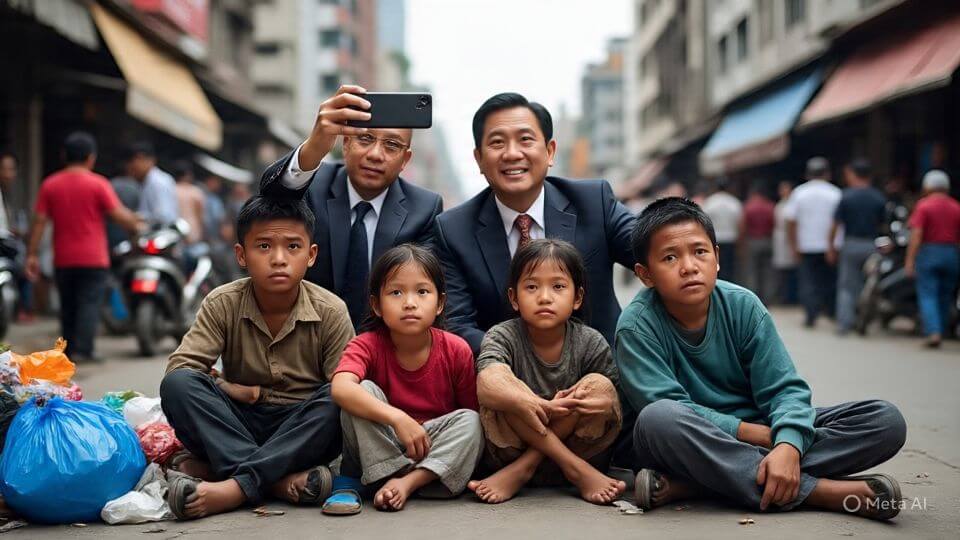How Filipinos Can Use Algorithms to Expose Corruption—Before Politicians Weaponize Them
🚨 The Silent Game-Changer in Elections
The next political shift won’t come from a party or a new face on a billboard. It’ll come from AI.
Imagine this:
- Real-time fact-checking that catches lies before the speech ends
- AI bots that track budget leaks and ghost projects
- Deepfake detectors that flag fake “heroic” disaster videos
But here’s the real question:
Will AI clean up politics—or just give corrupt systems smarter tools?
💡 3 Ways AI Is Already Reshaping Politics
1. The End of Fake News—or the Rise of Smarter Lies?
AI Fact-Checking Can:
- Compare past promises vs. current statements
- Detect budget discrepancies in real time
But It Can Also:
- Generate fake evidence
- Create convincing propaganda faster than humans can debunk it
2. The Rise of AI Politicians
Already Happening:
- Chatbot officials answering public service queries 24/7
- AI-generated campaign speeches and policy drafts
- Virtual candidates debating nonstop online
Prediction: Future elections may feature AI-written platforms—and voters won’t know the difference.
3. Smarter Fraud—or Smarter Detection?
AI Can Be Used To:
- Manipulate voter districts
- Flood feeds with fake praise and staged “benevolence”
Or It Can Fight Back:
- Track unusual voting patterns
- Expose troll farms and bot networks
- Audit public spending against actual infrastructure
⚖️ The Double-Edged Sword
| Benefit | Risk |
|---|---|
| Faster public services | Deepfake campaigns |
| Transparent policy analysis | AI-generated propaganda |
| Real-time fraud detection | Automated vote-buying via e-wallets |
🔍 Case Study: When AI Exposed Corruption
Researchers trained AI on years of government records. It found suspicious patterns in project approvals. Investigations followed. No press release. No drama. Just data.
🤖 Could AI Replace Politicians?
Arguments For:
- No empty promises—just data
- Zero corruption (if designed ethically)
- 24/7 governance
Arguments Against:
- Who controls the AI?
- Can it understand fairness, dignity, and pakikisama (relational harmony)?
🛡️ How Filipinos Can Protect Democracy from AI Abuse
✅ Demand Transparency Support laws requiring AI disclosure in campaigns
✅ Verify Claims Use fact-checking tools before sharing anything
✅ Push for Open-Source AI Prevent secret manipulation by powerful groups
🔥 The AI War Against Political “Epals”: How Filipinos Can Fight Back

The most dangerous weapon in Philippine politics isn’t vote-buying or intimidation—it’s the art of “epal” publicity stunts. Politicians exploit suffering for photo ops: handing out grocery packs with their faces plastered on them, posing with disaster victims like trophy catches, and turning public service into a 24/7 campaign ad. And now, AI is making its deception even more sophisticated. Deepfake videos can fabricate “heroic” efforts that never happened. Chatbots can spam social media with fake testimonials. Algorithmic propaganda can manipulate voter sentiment by flooding feeds with staged “benevolence.”
But here’s the brutal truth: AI doesn’t just empower politicians—it exposes them. Filipinos can weaponize the same technology to dismantle these frauds. AI-powered fact-checking can cross-reference project budgets with actual infrastructure (or lack thereof). Facial recognition audits can track how often politicians actually show up in their districts versus just appearing for camera ops. Social sentiment analysis can detect orchestrated praise from bot accounts. The game is no longer about who shouts the loudest—it’s about who controls the data.
The real battle? Owning the narrative. Politicians rely on Filipinos having short memories—but AI doesn’t forget. Imagine a public accountability bot that livestreams infrastructure projects, comparing promises to reality. Or a voice-clone detector that flags AI-generated endorsements. Or a crowdsourced corruption map where citizens upload evidence of misused funds, analyzed in real time.
The question isn’t whether AI will change politics—it already has. The only question left is: Will Filipinos use it to demand truth, or let politicians weaponize it for more lies? The winning move? Flood the system with transparency. If they fake generosity, AI can debunk it. If they manipulate perception, algorithms can reverse-engineer their tactics. The age of political epals is ending—not because they’ll disappear, but because technology will make their lies too expensive to maintain.
The ultimate irony? The same AI that helps politicians lie can also bury them in their own deceit. Filipinos just have to wield it first.
🎯 The Bottom Line: AI Doesn’t Decide—We Do
Technology doesn’t fix corruption. It amplifies whatever system it’s plugged into.
So the question isn’t “Will AI change politics?” It already has.
The real question is: Will Filipinos use it to demand truth—or let politicians use it to sell better lies?
The winning move? Flood the system with transparency. If they fake generosity, AI can debunk it. If they manipulate perception, algorithms can reverse-engineer their tactics.
The age of political epals is ending—not because they’ll disappear, but because their lies are becoming too expensive to maintain.
🧠 Too Cryptic? Explain Like I’m 12 (ELI12)
AI is like a super-smart robot that can check facts, spot lies, and track money. Politicians can use it to trick people—or we can use it to catch them.
If someone posts a fake video or makes a promise they don’t keep, AI can help us find the truth. But only if we use it first.







